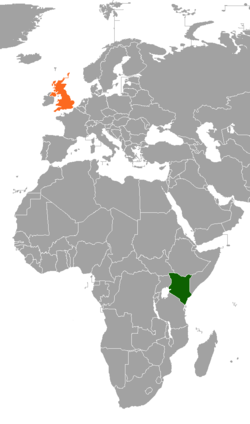Kenya–United Kingdom relations
Kenya–United Kingdom relations are bilateral relations between Kenya and the United Kingdom. The United Kingdom has been a partner of Kenya in many areas, particularly trade and security (military). Both nations are members of the Commonwealth of Nations and the United Nations.
 | |
Kenya |
United Kingdom |
|---|---|
| Diplomatic mission | |
| British High Commission, Nairobi | High Commission of Kenya, London |
| Envoy | |
| High Commissioner Jane Marriott | High Commissioner Manoah Esipisu |
British Empire
Kenya and the UK have historical relations dating back to the 19th century. Between 1824 and 1826 the Kenyan port city of Mombasa was under British occupation. In 1887 a 16-kilometre-wide strip in the Kenyan coast was leased by the British.[1] In 1895, Kenya became part of the East Africa Protectorate. Kenya, as a member of the British Empire, contributed troops during World War I and World War II. In 1920, the region became the Colony and Protectorate of Kenya. Kenya achieved independence from the UK in 1963 and was thus a colony of the UK between 1895 and 1963 (68 years).
Between 1963 and 1964, the country retained Elizabeth II as the head of state and Queen of Kenya. The Queen was represented in Kenya by a Governor-General, who was Malcolm MacDonald. The Prime Minister of Kenya was Jomo Kenyatta. In 1964, Kenya became a republic with the President of Kenya as head of state.
Elizabeth II visited Kenya four times, in 1952, 1972, 1983 and 1991.
Post independence
Following the violent struggle for independence, Kenya and the UK maintained warm relations. At one point, the UK was considered Kenya's most significant ally in the West. The UK provided economic and military assistance to Kenya.[2]
Upon the election of Uhuru Kenyatta as President of Kenya, the UK sought to distance itself diplomatically from Kenya, as Kenyatta had been indicted by the International Criminal Court (ICC) for crimes during the post election violence of 2007. Upon the election of Uhuru Kenyatta as President, the High Commissioner of the UK, Christian Turner, stated that the UK would only deal with Kenya on essential business.[3]
In 2014, Kenyatta's case in the ICC was dropped.[4]
Presently, relations between both countries remain cordial.
Military
The British Army trains troops in Kenya, in preparation for operations in countries such as Afghanistan. The Unit is known as the British Army Training Unit Kenya (BATUK). It is a permanent training unit with stations in Kahawa, Nairobi (which is a smaller unit) and Nanyuki. BATUK provides logistical support to visiting units of the British Army. It consists of 56 permanent staff and a reinforcement of 110 personnel.[5]
Look East policy
.jpg)
The Kenyan government had adopted a Look East policy and since China was key to the policy, the Kenyan government turned to China for infrastructural funds.
Kenya's relations with the UK were debated in Britain's parliament. British Members of Parliament (MPs) were particularly concerned with the growing influence of China in Kenya as Britain had sought to isolate Kenya diplomatically after Kenyatta's election. The MPs noted with concern that China's efforts in Kenya to develop infrastructure were successful and that Britain had not been supporting Kenya in the same way.[6]
Culture and remnants
Kenya has a large English speaking population; one of Kenya's official languages is English. Kenya drives on the left, a practice retained from its time as a British colony. There are 25,000 British citizens in Kenya.[7] More than 200,000 Britons visit Kenya yearly.[7] Kenya is also a member of the Commonwealth of Nations.
Trade
Bilateral trade between both countries exceeds KES.139 billion (£1 billion).[7]
The UK is also one of the largest investors in Kenya, Vodafone plc owns stake in Kenya's largest taxpaying firm, Safaricom. The UK is also a major buyer of Kenyan horticultural produce.[7] The UK imports 8.5% of Kenyan goods and 3.4% of British goods make up Kenya's imports. The UK was Kenya's largest source of FDI, however China is now the largest source of FDI.
The UK aims to double trade within the coming years. Although Kenya's exports lack diversification, trade between both countries is never heavily in favour of the other.
Resident diplomatic missions
References
- . Historical chronology | UNESCO. Retrieved on 15 January 2015.
- . Kenya -- Foreign Relations. Retrieved on 16 January 2015.
- . US WARNS OF ICC CONSEQUENCES. Retrieved on 16 January 2015.
- . ICC drops murder and rape charges against Kenyan president. Retrieved on 16 January 2015.
- . British Army Training Unit Kenya (BATUK). Retrieved on 16 January 2015.
- . China forces the UK to rethink Kenya policy. Retrieved on 16 January 2015.
- .The Ties That Bind The United Kingdom and Kenya. Retrieved on 16 January 2015.
- High Commission of Kenya in London
- High Commission of the United Kingdom in Nairobi
.svg.png)
